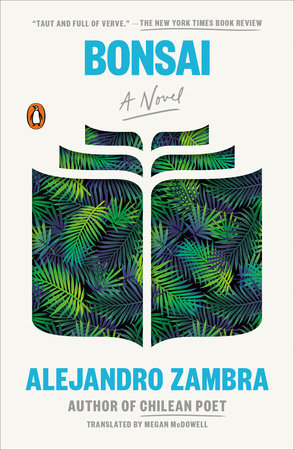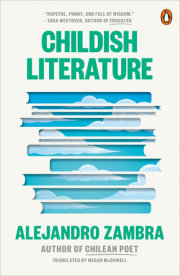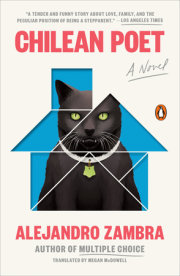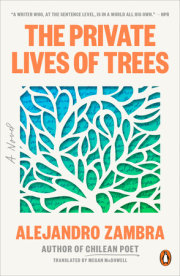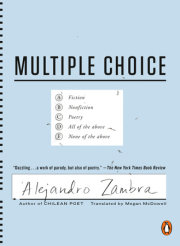In the end she dies and he is alone, although really he had been alone for some years before her death, before Emilia's death. Let's say her name is or was Emilia and that his name is, was, and will be Julio. Julio and Emilia. In the end Emilia dies and Julio does not. The rest is literature:
The first night they slept together it was by accident. There was a test in Spanish Grammar II, a subject neither of them was great at, but since they were young and in theory up for anything, they were even up for studying Spanish Grammar II at the Vergara twins’ house. The study group ended up being bigger than originally planned: someone put on music, saying she always listened to music while she studied; someone else brought vodka, arguing it was hard for him to focus without vodka; and a third person went to buy oranges, because she found vodka without orange juice intolerable. By three in the morning they were all perfectly sloshed, so they decided to go to sleep. And although Julio would have preferred to spend the night with one of the Vergara twins, he resigned himself pretty quickly to sharing the tiny spare bedroom (i.e., the maid’s room) with Emilia.
Julio didn't like how Emilia asked so many questions in class, and Emilia found it annoying that Julio passed his classes even though he hardly ever set foot on campus, but that night they both discovered the emotional affinities that any couple can discover if they only put their minds to it. Needless to say, they did very badly on the exam. A week later, for the makeup test, they studied with the Vergaras again, and again they slept together, even though this time there was no need to share a room, since the twins' parents were away in Buenos Aires.
Not long before she got mixed up with Julio, Emilia had decided that from then on she was going to fuck-what the Spanish call “follar”-and she would no longer make love with anyone or hook up with anyone, much less would she screw, or “culiar,” as a Chilean would say. This is a Chilean problem, Emilia said to Julio, with a boldness she only displayed in the dark-though in a very low voice, of course: This is the problem with young Chileans. We’re too young to make love, and in Chile, if you don’t make love you can only culiar, but I don’t want to screw you, I’d rather follar, I’d rather fuck you like they do it in Spain.
At that time Emilia had never been to Spain. Years later she would live in Madrid, a city where she'd do her fair share of fucking, though no longer with Julio, but rather, mostly, with Javier Mart’nez and with çngel Garc’a Atienza and with Juli‡n Alburquerque and
even-though only once and a little under duress-with her Polish friend Karolina Kope. However, that night, this second night, Julio became Emilia's second sexual partner. Or, as mothers and certain psychologists say with some degree of hypocrisy, he became Emilia's "second man," while Emilia became Julio's first serious relationship. Julio had avoided serious relationships, hiding not from women but from seriousness, since by that point he knew that seriousness was every bit as dangerous as women, if not more so. Julio knew he was doomed to seriousness, and he tried, stubbornly, to thwart his serious fate, even as he stoically awaited that frightening and inevitable day when seriousness would come to settle in his life for good.
Emilia's first boyfriend-or "pololo," as Chileans say-was clumsy, but there was something authentic in his clumsiness. He made a lot of mistakes and almost always knew how to recognize and fix them, but some mistakes are impossible to fix, and the clumsy guy, Emilia's first, made one or two of these unforgivable mistakes. It's not worth getting into what they were.
The two of them were both fifteen when they started dating, but when Emilia turned sixteen and seventeen the clumsy boyfriend remained fifteen. And so on: Emilia turned eighteen and nineteen and twenty-four, and he stayed fifteen; she turned twenty-seven, twenty-eight, and he was still fifteen, right up until Emilia turned
thirty. Emilia didn't celebrate any more birthdays after thirty, not because she started lying about her age, but because a few days after her thirtieth birthday, she aged no more, because, starting then, she was dead.
Emilia’s second boyfriend was too white. With him, she discovered hiking, bike rides, jogging, and yogurt. It was in particular a time of abundant yogurt, and this, for Emilia, was important, because she was just emerging from a period of abundant pisco, of long, convoluted nights of pisco with Coke and pisco with lemon and even pisco on its own, neat, no ice. They fooled around a lot but they never went all the way, because he was really white and that made Emilia distrust him, even though she herself was very white, almost completely white, albeit with short, very black hair, it’s true.
The third guy was really a jackass. From the start she knew the relationship was doomed to fail, but even so they lasted a year and a half, and he was her first sexual partner-her “first man”-when she was eighteen and he was twenty-two.
Between the third and the fourth there were several
onetime dalliances that were largely motivated by boredom.
The fourth was Julio.
In accordance with a long-standing family tradition, Julio's sexual initiation was outsourced, for the price of ten thousand pesos, to Isidora, "cousin Isidora," who of course was not named Isidora and was not Julio's cousin. All the men of the family had gone to Isidora, a still-young woman with miraculous hips and a certain propensity for romanticism, who agreed to service them even though she was no longer a hooker, not a real one: these days-and she always found a way to clarify this-she worked as a lawyer's secretary.
Julio first met cousin Isidora when he was fifteen, and he went on meeting her over the following years, as a gift on special occasions, when he was insistent enough, or when his father's cruelty waned and gave way to the inevitable period of fatherly repentance, and then to the period of fatherly guilt, whose happiest symptom was financial largesse. Needless to say, Julio was inclined to fall in love with Isidora, he cared about her, and she, fleetingly tender toward the bookish boy who dressed all in black, treated him better than her other patrons, pampered him; in a way, she educated him.
It wasn't until he turned twenty that Julio started to approach women his own age with socio-sexual intentions; his success was limited, but still enough for him to decide to quit Isidora. To quit her, of course, the same way one quits smoking or betting on horse races. It wasn't easy, but for some months before that second night with Emilia, Julio had considered himself free of vice.
That second night, then, Emilia competed with a single rival, though Julio never actually compared them, partly because there was no possible comparison and also because Emilia came to be, officially, the only love of his life, and Isidora merely a previous, agreeable source of fun and suffering. When Julio fell in love with Emilia, all the fun and all the suffering that came before the fun and suffering that Emilia brought him became mere imitations of true fun and true suffering.
The first lie Julio told Emilia was that he had read Marcel Proust. He didn't usually lie about his reading, but that second night, when they both knew they were starting something, and that however long it lasted, this something was going to be important-that night, Julio deepened his voice, feigning intimacy, and said that, yes, he had read Proust when he was seventeen, during a summer in Quintero. By that time no one summered in Quintero; not even Julio's parents, who had met at El Durazno Beach, ever went to Quintero, a lovely beach town now overrun by the masses, where Julio, at seventeen, had commandeered his grandparents' summerhouse so he could shut himself in and read In Search of Lost Time. It was a lie, of course: he had gone to Quintero that summer, and he had read a lot, but he'd read Jack Kerouac, Heinrich Bšll, Vladimir Nabokov, Truman Capote, and Enrique Lihn, not Marcel Proust.
That same night, Emilia lied to Julio for the first time, and the lie was, also, that she'd read Marcel Proust. At first she merely agreed: I read Proust too. But then there was a long, pregnant pause, which wasn't an uncomfortable silence but rather an expectant one, so Emilia had to complete the story: I read it recently, just last year, it took me like five months, I was really busy, as you know, with classes. But I decided to read all seven volumes and those were truly the most important months of my life as a reader.
She used that expression: my life as a reader-she said that those had been, without a doubt, the most important months of her life as a reader.
In Emilia and Julio’s story, in any event, there are more omissions than lies, and fewer omissions than truths, truths of the kind that are said to be absolute and tend to be uncomfortable. Over their time together, which wasn’t long but was long enough, they confided in each other their least public desires and aspirations, their disproportionate feelings, their brief and exaggerated life stories. Julio confessed to Emilia things that only his psychologist should have known, and Emilia, in turn, made Julio into a kind of retroactive accomplice to every one of the decisions she had made over the course of her life. The time, for example, at fourteen, when she’d decided to hate her mother: Julio listened attentively and offered the opinion that, yes, fourteen-year-old Emilia had made a good decision, no other decision had been possible, he would have done the same, and, certainly, if they’d been together back then, when they were fourteen, he definitely would have supported her.
Emilia and Julio’s was a relationship riddled with truths, with personal disclosures that quickly built up a complicity they strove to see as unassailable. This is, then, a light tale that becomes heavy. This is the story of two student enthusiasts of the truth, aficionados of deploying words that seem like truth, of smoking endless cigarettes, and of enclosing themselves within the violent complacency of those who believe themselves better, purer than others, than that immense and detestable group called everyone else.
They quickly learned to read the same way, to think similarly, and to hide their differences. Very soon they comprised a vain private world. For a time, at least, Julio and Emilia managed to meld into a single entity. They were, in short, happy. There can be no doubt about that.
II.
Tantalia
After that they went on fucking, follando, as it were, in other people's houses and in motels where the sheets smelled like pisco sour. They fucked for a year and that year seemed short to them, though it was actually very long, an unusually long year, at the end of which Emilia went to live with Anita, her childhood friend.
Anita was no fan of Julio's-she thought he was arrogant and depressive-but she still had to put up with him at breakfast, since he was a permanent guest in the cramped and rather inhospitable apartment that Emilia and Anita shared. Once, maybe to prove to herself and her friend that deep down she didn't really dislike Julio, she even made him soft-boiled eggs, his favorite. What really bothered Anita about Julio was that he had changed her friend:
You changed my friend. She didn't used to be like that.
And have you always been like this?
Like what?
Like this, how you are.
Emilia, conciliatory and sympathetic, intervened. Why would you want to be with someone if they didn't change your life? She said that, and Julio was there when she said it: that life only made sense if you found someone who would change it, who would destroy your life as you knew it. Anita found the theory a little dubious, but she didn't argue. She knew that when Emilia used that tone there was no point in contradicting her.
Julio and Emilia's quirks weren't just sexual (though they did have those), or emotional (though those abounded), but also literary, so to speak. One especially happy night, as a joke, Julio read aloud a RubŽn Dar’o poem that Emilia acted out and trivialized until it became a blatantly sexual poem, a poem of explicit sex, complete with screams and orgasms. After that it became a habit, this reading out loud-quietly-every night before fucking. They read The Book of Monelle by Marcel Schwob, and The Temple of the Golden Pavilion by Yukio Mishima, both of which turned out to be reasonable sources of erotic inspiration. Very soon, though, the readings became remarkably more diverse: they read A Man Asleep and Things by Georges Perec, several stories by Juan Carlos Onetti and Raymond Carver, poems by Ted Hughes, Tomas Transtršmer, Armando Uribe, and Kurt Folch. They even read excerpts from Nietzsche and Emil Cioran.
One fine or perhaps very bad day, chance led them to the pages of The Book of Fantasy by Jorge Luis Borges, Adolfo Bioy Casares, and Silvina Ocampo. After envisioning crypts and doorless houses, after taking inventory of the traits of unnameable ghosts, they landed on "Tantalia," a short story by Macedonio Fern‡ndez that affected them deeply.
“Tantalia” is the tale of a couple who decide to buy a little plant to keep as a symbol of the love that binds them. Too late, they realize that if the plant dies, the love that binds them will die too. And since the love that binds them is immense and they aren’t willing to sacrifice it for anything, they decide to lose the plant amid a crowd of identical plants. Then comes the desolation, the tragedy of knowing that now they can never find it again.
She and he, Macedonio's characters, had a plant of love and lost it. Emilia and Julio-who aren't exactly characters, though maybe it's best to think of them that way-have been reading before fucking for several months, and it's very pleasant, he thinks and she thinks, and at times they think it simultaneously: It's very pleasant, it's beautiful to read and talk a little about what we read before tangling our legs together. It's like working out.
It wasn't always easy to find some reason in the text, small as it may be, to fuck, but in the end they always managed to find a paragraph or verse that, randomly drawn out or perverted, would work, would titillate them. (They liked that word, titillate, that's why I'm including it here. They liked it as much as they liked being titillated.)
Copyright © 2022 by Alejandro Zambra. All rights reserved. No part of this excerpt may be reproduced or reprinted without permission in writing from the publisher.

